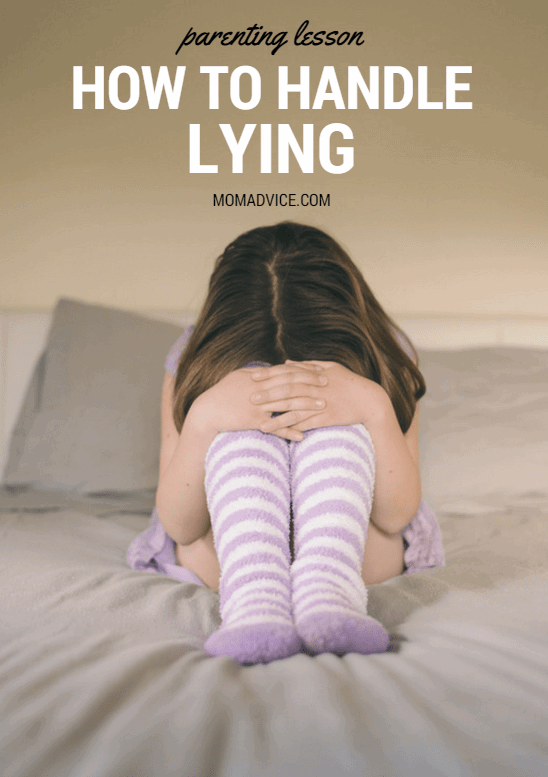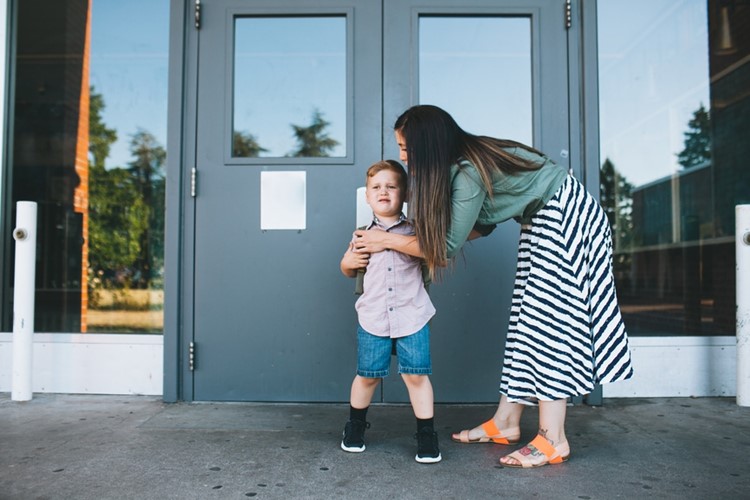
Editor’s Note- I’m so honored to have Kristina, from Thriving Parents, join our writing team this year. MomAdvice should offer…well…mom advice! I’m no expert, but I am proud to offer to you Kristina’s incredible wisdom on parenting. Today she shares some tips on what to do when your child lies. Can I say I’ve been doing it all wrong? So thankful to read her words today on our site!
“It’s this way to the bathroom.” A little girl led the other kids to the bathroom so they could all wash their hands before a snack. As the only adult left in the room, I could hear the water running and the kids being cooperative about taking turns.
Crash!
All of a sudden the kids started scrambling. I heard muttering and whispers. Then I heard this conversation:
“Let’s go get our moms.”
“NO! We can’t! They’ll be mad.”
“They won’t be mad. They’ll show us how to clean it up.”
“NO! I’ll get in big trouble!”
“For spilling something? Accidents happen.”
“I’ll get punished and then won’t get to play. I’ll clean it up.”
This is a true story of what happened once when we went to a playdate. The little girl had knocked over a bottle of baby powder. In an effort to be responsible and clean it up, she wet a towel and started to rub it on the baby powder spilled on the floor. If you’ve never seen baby powder get wet, be thankful. The baby powder turned into a white, pasty mess all over the floor and bathroom counter.
This was an accident. This little girl was so afraid of getting in trouble for an accident, she lied to her mom about what had happened.
Lying is pretty common among kids. There are a lot of reasons that kids lie. I listed over 10 reasons on this post, Why do kids lie? The most common thread among all those reasons is kids are afraid of getting into trouble.
It’s our natural reaction to get angry when our child lies. We feel disrespected. We feel like our kids are trying to be sneaky. We do not want to raise dishonest children.
What you may not know is lying is a developmental skill. Children usually start lying around 3 years old. One study says when a child lies at a young age, it shows they have a higher intelligence. It’s attributed to the Theory of Mind, where a child is able to differentiate that people have different opinions, beliefs, and desires.
So what should you do when your child lies?
Acknowledge your child but don’t acknowledge their lie (at this time).
I know this sounds foreign and a lot of you must be thinking if you don’t acknowledge the lie, it’ll encourage them to lie again. There’s nothing further from the truth. Let me explain.
Adults lie because of stress. We lie when we’ve forgotten to rsvp to a birthday party, when we want to pay less for our child’s ticket to the movie theater, or when we are running late.
Children lie out of survival. For them, it’s not about the lie. It’s about not disappointing us. Everyone has a need to be loved and accepted – especially children. They feel a need to convince us they’re telling the truth so they don’t feel like we’ll take away our love and acceptance. Now you and I know we would never take those away. Children’s brains are still developing. While they may say they know they have our unconditional love, their brain goes into a state of fight, flight, or freeze. They need to know they can trust us and we’ll love them regardless of when they make a bad decision.
When you consistently acknowledge the child but not their lie, you won’t be reinforcing the lie with negative attention.
What does this look like?
You walk into the kitchen to find your 5-year-old with a cookie in her mouth.
“Are you eating a cookie before dinner?”
“No.”
Here’s where you’d normally want to say, “Open your mouth and let me see” or something similar because you just KNOW there’s a cookie in her mouth. Instead, try saying, “I know you must be hungry. Dinner will be ready soon.”
Later, tell her, “I know you didn’t want to admit you had a cookie in your mouth earlier. I think you may have been afraid you’d get in trouble. Next time I need you to be honest with me so I know I can trust you.” If she continues to protest (“No, Mommy, I didn’t!”), let her know the moment has passed. “It’s over now. I just need you to be honest with me next time.”
We don’t need to harp on mistakes. Kids will think about things after we’re done talking about them. Adults do the same thing. Your child doesn’t need judgment because she knows what she did wrong. She doesn’t need to admit it out loud to know she was wrong. Believe me – she knows. Instead, she needs to know she has your love and support.

Here are some other ways you can handle lying:
Change your reaction
Do you make it easy for our child to be honest? Adults can have a hard time hearing and not reacting negatively to the truth. If your reaction is too harsh or critical, a child is going to feel less safe coming to you when they need help and have messed up. This will lead to more lies so they can avoid your judgment.
Understand the emotion
There’s typically an emotion behind the lie. Are they feeling frustrated, left out, or scared? Find the root of the problem and you can work on strategies for handling the problem in the future.
Offer alternative solutions
I once watched as one of our children elbowed her sister and pushed her off of a chair. Before I could pause, I said, “Why did you just push your sister?”
“I didn’t,” she replied. I had seen her do it so I knew she was lying. I didn’t choose to walk away and discuss it later because this was a safety issue.
Instead, I handled it this way: “I think you wanted your sister off of the chair. If that happens again, what could you do?”
There was no response. She was embarrassed and I could see she froze in place. I continued talking to her.
“Next time, you could either ask her to move, ask a parent for help, or move to another seat yourself. Which one do you think you can do next time?”
Again, there was no response.
“I’ll let you think about those choices and we can talk about which one you’ll do next time later. Remember, the choices are: you could either ask her to move, ask a parent for help, or move to another seat yourself.”
Then I walked away. She knew what she had done was wrong. She didn’t need me to repeatedly point it out to her.
Later that night at bedtime, I asked her the question again. “Next time you want your sister to move from a chair, what could you do? Ask her to move, ask a parent for help, or move to another seat?”
“Ask you for help.”
“Great! I’ll always help you when you need it. It’s really important we keep everyone safe in our family and that’s why we don’t push people.”
I gave her 3 choices because her brain was stuck in fight, flight, or freeze mode and she wasn’t capable of thinking of them on her own. She was embarrassed she was caught red-handed. By giving her 3 choices, she had the freedom to pick which one worked for her, or she could have added her own choice.
Have your child repair a mistake
If your child broke something, have them repair it. If they said unkind words to someone, have them make a list of kind things about that person. If they threw books all over the floor, have them pick them up.
Don’t be judgmental, critical, or negative
It can be difficult to hide our disappointment in our kids. They can usually see it on our face before we even realize we’re doing it. Not being judgmental, critical, or negative is important because you want your child to be able to come to you and be honest with you in the future – especially in the teenage years.
It’s going to take some time for your child to stop lying. The first time you don’t react to their lie, they’re going to be surprised. They’re going to test you to see if there will be a reaction the next time. Keep with it! Eventually, they’ll begin to be honest because they know they can come to you without fear of punishment.
The best thing we can do is to teach our child that everyone makes mistakes. It’s important to own up to those mistakes and try to do better the next time.
During these formative years, we want our kids to make as many mistakes as possible. This way we’re available to help guide them on how to pick up the pieces and repair their mistakes, if they need it. When they’re old enough to go out into the world, they’ll be better equipped to handle mistakes and uncomfortable situations.
Here are some books to read with your child about lying:
Liar, Liar
Half-Truths & Brazen Lies
Telling the Truth: A Book About Lying
Ruthie and the Not So Teeny Tiny Lie
The Berenstain Bears and the Truth
Help Me Be Good About Lying
Howard B. Wigglebottom and the Monkey On His Back
Lying Up a Storm
–Kristina
Kristina Grum is a Certified Parent Educator who has over a decade of experience working with children, including being a classroom teacher. She took the (very) long route to loving motherhood. These days she strives for ways to connect with her kids, while using shortcuts to manage and organize her home. She is a postpartum mood disorder survivor who thrives on helping others find the joy in parenthood that is just lurking around the corner. She currently teaches positive discipline parenting classes in her local area and she believes that every parent can shift from barely surviving to thriving in Parenthood. Visit her on Thriving Parents today!
